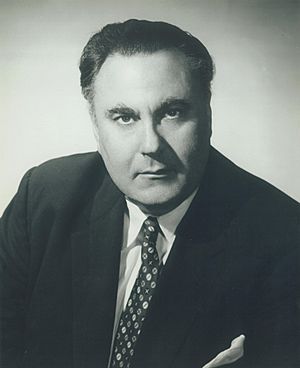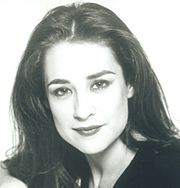Kurt Adler facts for kids
Quick facts for kids
Kurt Adler
|
|
|---|---|
 |
|
| Born | March 1, 1907 Neuhaus, Austro-Hungarian Empire (now Jindřichův Hradec, Czech Republic)
|
| Died | September 21, 1977 (aged 70) |
| Nationality | Austrian/Czech |
| Citizenship | American |
| Education | University of Vienna (MA) |
| Occupation | Conductor, Pianist, Chorus Master |
| Known for | Conductor and Chorus Master, New York Metropolitan Opera, 1943–1973 |
Kurt Adler (March 1, 1907 – September 21, 1977) was an Austrian classical chorus master, music conductor, author and pianist. He was best known as the chorus master and lead conductor of the Metropolitan Opera in New York City from 1943 to 1973. He conducted in Austria, Germany, Russia, Czechoslovakia, Ukraine, United States, Canada, Mexico, Yugoslavia, Romania, Bulgaria and Hungary.
Contents
Early life
Kurt Adler was born in Jindřichův Hradec/Neuhaus, Bohemia (now Czech Republic), during the Austro-Hungarian Empire to a bourgeois Jewish family. He was the only child of Siegfried Adler (born June 26, 1876 in Luka u Jihlavy, Bohemia), a textile factory owner, and Olga (Fürth) Adler (born April 3, 1882 in Sušice/Schüttenhofen, Bohemia (now Czech Republic). Both parents were murdered by the Gestapo during World War II, after they were deported in 1942, from Vienna, Austria, to Izbica concentration camp, which served as a transfer camp, to the Bełżec extermination camp in Poland on May 15, 1942. His paternal grandparents, Jakob and Eveline Adler are buried in Neuhaus (now Jindřichův Hradec), Hebrew Cemetery. His maternal grandparents, Albert and Katherine Fürth are buried in Sušice (Schüttenhofen), Bohemia (now Czech Republic).
During the 1930s many now-famous musicians, including Adler, emigrated to the United States to escape from Nazism. Adler left for the United States on October 9, 1938. He sailed from Rotterdam, Holland in 1938 on the "SS Statendam". The ship was later destroyed in the Rotterdam Blitz. He was naturalized on March 21, 1944.
Education
Kurt Adler began studying music at age six under cantor Jacob Fürnberg, Neuhaus), His first public appearance was at age fourteen.
His entire musical education was in Vienna, Austria. Other teachers include Prof. Richard Robert, Fanny Boehm-Kramer, Prof. Alexander Manhart (1875–1936) (piano); Prof. Karl Weigl (1881–1949), Prof. Guido Adler (1855–1941), Prof. Wilhelm Fischer (1886–1962) (theory); Prof. Ferdinand Foll (1867–1929), also Hermann Weigert (1890–1955), Erich Kleiber (1890–1956) (conducting). In 1925, he graduated from the classical Akademisches Gymnasium, Vienna. In 1927, he earned a degree of Musicology from the University of Vienna, corresponding to Master of Arts, Philosophical Faculty of the University of Vienna.
Life in the arts and humanities
Kurt Adler began his professional career in Germany on the musical staff of the Berlin State Opera. He later associated with the famous German Opera Theatre in Prague (where Rudolf, Szell and Schick also served) and with the Municipal Opera House in Berlin. He joined the Metropolitan Opera in 1943, under the management of Edward Johnson then in conjunction with Rudolf Bing, General Manager, from 1945 to 1973.
Maestro Adler's press announcement upon his recruitment as Chorus Master of the Metropolitan Opera in New York City said, "That since Giulio Setti's time, ten years ago, there never has been a single Chorus Master for the entire Italian, French, German, English repertoire and with my appointment, the gradual reorganization and training will again be centralized in one hand."
Languages
English, German, Czech, Russian, French, Italian, Spanish, Latin, Greek, Romanian, Yiddish, Hebrew.
Engagements
- 1927–29 Assistant Conductor, Berlin State Opera. First opera conducted, Peer Gynt (Grieg).
- 1929–32 Conductor, Prague German Opera Theater.
- 1932–33 Conductor, Berlin Municipal Opera House.
- 1933–38 Conducting symphony concerts and opera all over Europe.
- 1933 Conductor of orchestral concerts, Vienna Grosser Musikvereinssaal.
- 1933 Founder of the Unio Opera Company, Vienna.
- 1933–35 First Conductor, Kiev, National Opera House of Ukraine.
- 1935–37 Founder, Musical Director, and first conductor of the Symphonic Orchestra Stalingrad (U.S.S.R.).
- 1938–43 U.S.A. Conducting concerts and concertizing as pianist all over U.S. and Canada.
- 1938–39 Pianist, three transcontinental tours of the United States.
- 1939–41 Musical Director, Friendship House, New York City.
- 1943 Assistant Conductor to Leopold Stokowski, Metropolitan Opera, New York City.
- 1943–73 Chorus Master, Conductor, Metropolitan Opera, New York City, New York (USA).
- 1944–47 Musical Director, Opera Nacional and Opera de Mexico, Mexico City.
- 1952 Musical Director, Central City Opera Festival, Central City, Colorado.
- 1954 Musical Director of opera performances at Greek Theatre, Hollywood, California.
Conductor of numerous broadcasts and television performances of operatic and symphonic music.
Teaching positions
- 1929–32 Organizer and Conductor of the Students Orchestra of the German Academy of Music (Deutsche Akademie für Musik und darstellende Kunst in Prag), Prague, Czechoslovakia.
- 1934–35 Conductor, orchestra of the Kiev Conservatory of Music, Kiev (Ukraine).
- 1935–37 Professor of the Opera class at the Conservatory of Music, Stalingrad (U.S.S.R.)
- 1938–41 Teacher of piano, theory; classes in chamber music; coach; New York City.
Quotes
- Asked, "What do you consider your outstanding achievement?" Response, "Having escaped Hitler, having founded and directed the first Symphonic Orchestra Stalingrad." Asked, "What has helped you most in your career?" Response, "Artistic honesty, sense of humor, treatment of fellow artists (singers, chorus, orchestra) with utmost consideration for their values as human beings." Asked, "What has been your most thrilling musical experience?" Response, "First time when I heard Toscanini conduct with the Scala in 1928." Asked, "If you hadn't chosen your present career what would your second choice be?" Response, "would not have talent for anything else." Asked, "Are most of your friends musicians?" Response, "all kinds of intellectuals."
- "Many instrumentalists and singers insist on putting themselves into the foreground. Yet though they may be strong personalities or have complete mastery of their medium, still I would not call them real artists. A real artist must be humble. Vanity has been the core of many virtuoso careers but it also has been the end of genuine artistic growth. Psychologically, an accompanist and coach must try to search for and understand where the roots of his soloist's artistry lie. These roots are as varied as the individual artists. Faith – religious, metaphysical, or materialistic – is one of the strongest roots; faith in oneself is part of it. Some great artists – Richard Wagner, for instance – were extremely self-centered, compensating for this fault by preaching altruism in their works. This brings us to another root of artistry: compensation for shortcomings in one's makeup – atonement for real or imagined sins and errors. A third very important root is rebellion against family, upbringing, or an adverse fate. Among those who rebel are some of our greatest artists, who have become what they are by surmounting seemingly overwhelming odds. Complacency is not a good stimulus to artistry."
- "In your world of rapidly changing values – welcome changes when they are the results of technical and scientific progress – spiritual, ethical, and artistic values tend likewise to change, but much more slowly, and not always for the better. What the future will bring, no one can say. I should like to venture the opinion that the vistas opening for us will render us more humble, more concerned with inner or spiritual values. Our technological advances should give us more time; we shall need culture and be able to afford it."
Personal life
On March 10, 1948, Adler married Irene Hawthorne (1917–1986) (birth name Irene McNutt), former prima ballerina soloist of the Metropolitan Opera.
On September 16, 1965, Adler married Christiane Tocco. One daughter: Eveline
On September 21, 1977, Adler died at home in his sleep, in Butler, New Jersey, of uremia/chronic glomerulonephritis.
His hobbies included stamp and book collecting.
His athletics included soccer, field hockey (All Austrian 1926), Track and Field, swimming, tennis, and ping-pong.
His instruments were piano, organ, harmonica, harpsichord, and celeste


